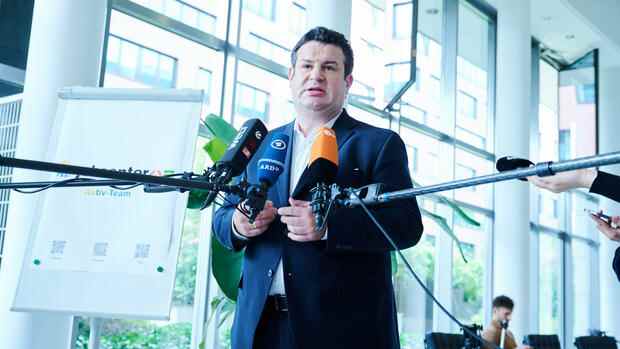Berlin The Berlin-Lichtenberg job center rolled out the red carpet for Hubertus Heil (SPD). Here in the east of the capital, the Minister of Labor is looking at what should be common practice in all job centers in the future: training people and placing them in jobs instead of threatening them with sanctions and punishing them. A team of mediators in Lichtenberg has been working for eight years according to the principle that should form the basis of the planned citizens’ income.
“We need a different approach and need to reduce bureaucracy,” explains Heil. Citizens’ income is one of the biggest social reforms in years. The federal government is not only increasing the standard rate, but is also placing a stronger focus on further training in order to increase the integration chances of benefit recipients.
In the morning, the federal cabinet had passed Heil’s draft law, with which the SPD and Greens want to leave Hartz IV behind. In the future, benefit recipients should be able to meet the welfare state more “on an equal footing” than before. Existing assets and one’s own apartment are no longer touched as quickly as before. During a six-month “period of trust”, breaches of duty by recipients of basic income are not sanctioned, after which the standard rate may be reduced by a maximum of 30 percent. In the future, qualification should also have priority over placement in the next best job.
Recently, the coalition also agreed to change the procedure for adjusting the standard rates so that the expected price development is better taken into account. A single recipient of citizen income will receive 502 euros a month in the future; the Hartz IV standard rate is currently 449 euros.
Top jobs of the day
Find the best jobs now and
be notified by email.
In addition, the coalition wants – contrary to what was originally planned – not only to enable pupils, students and trainees to earn more than before, but also to the other benefit recipients. Overall, the reform will be significantly more expensive than originally planned, mainly due to the higher standard rates. The Ministry of Labor calculates at almost 4.8 billion euros in the current year, the total will increase to almost 5.9 billion euros by 2026.
Fierce criticism came again from the economy on Wednesday: the citizen’s allowance is a “fatal milestone in terms of labor market policy,” said employer president Rainer Dulger. “This does not build bridges into working life, but into the social transfer system.” The President of the Association of Family Entrepreneurs, Reinhold von Eben-Worleé, criticized that the government was sending a “completely wrong signal to the community of solidarity” that had to finance the reform.
>> Also read here: Social association criticizes new standard rates as too low
Craft President Hans Peter Wollseifer had noted that the higher standard rates further reduced the gap to lower wage groups, so that work was hardly worthwhile. The union then recommended that wages would have to be raised.
Holger Schäfer, labor market expert at the Institute of German Economics (IW), points out that future recipients of the basic income will not only have to pay the standard rate, but also that the heating costs will be covered in full, while employees will have to pay the increasing bills themselves.
Almost 1000 euros under the line
A single recipient of citizen income in Berlin is entitled to rent payments of currently up to 426 euros in addition to the 502 euros standard rate and receive 60 to 70 euros for the heating costs with gas heating, whereby these values will probably be adjusted upwards soon. The bottom line is that he comes to almost 1000 euros a month.
A full-time job at the future minimum wage of twelve euros brings in a good 2,000 euros gross and around 1,470 euros net, Schäfer calculates. “In this respect, the employee is in a better position than the recipient of basic income.” This is all the more true because the employee can claim transfer payments such as housing benefit if necessary for the assumed income.
Minister of Labor Heil also rejects the criticism that the government is violating the wage gap requirement: “It is wrong that work is no longer worthwhile,” he says in the job center. For example, low earners would be supported by increasing the minimum wage to twelve euros from October or by reducing social security contributions in the third relief package. The upcoming housing benefit reform will also help.
It is also silly to say that citizen income paves the way to an unconditional basic income, emphasizes the minister. “We have to offer people in need security and show that the state is on their side.”
Citizens’ income should start on January 1st, said Heil, but the implementation will then take place “step by step” because the Federal Employment Agency (BA), for example, needs time for IT adjustments. Benefit recipients in Lichtenberg who have already had experience with the new approach are satisfied. “I felt treated like a human being again,” says Mike Prehm, who initially looked after his parents and then looked for work for seven years. “Somebody got in touch with me,” agrees Ronny Donintzki, who has now started a job as a cleaning specialist. He had never heard of the job center before.
More: The new citizens’ allowance: what the federal government is planning in concrete terms
